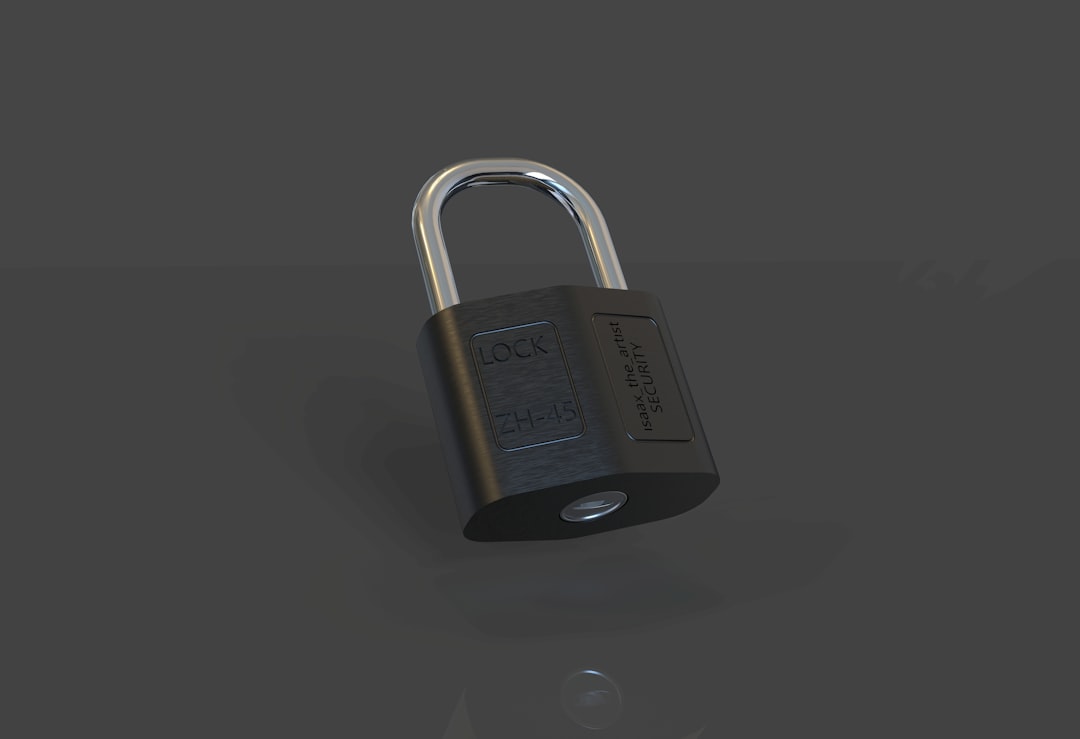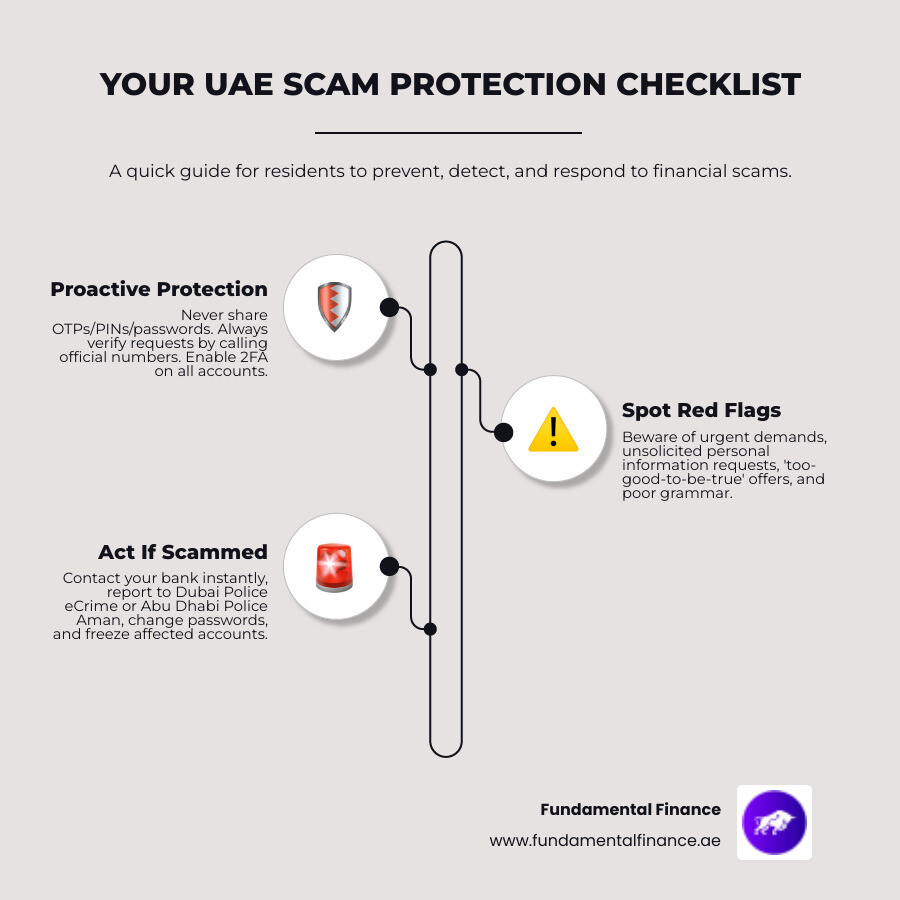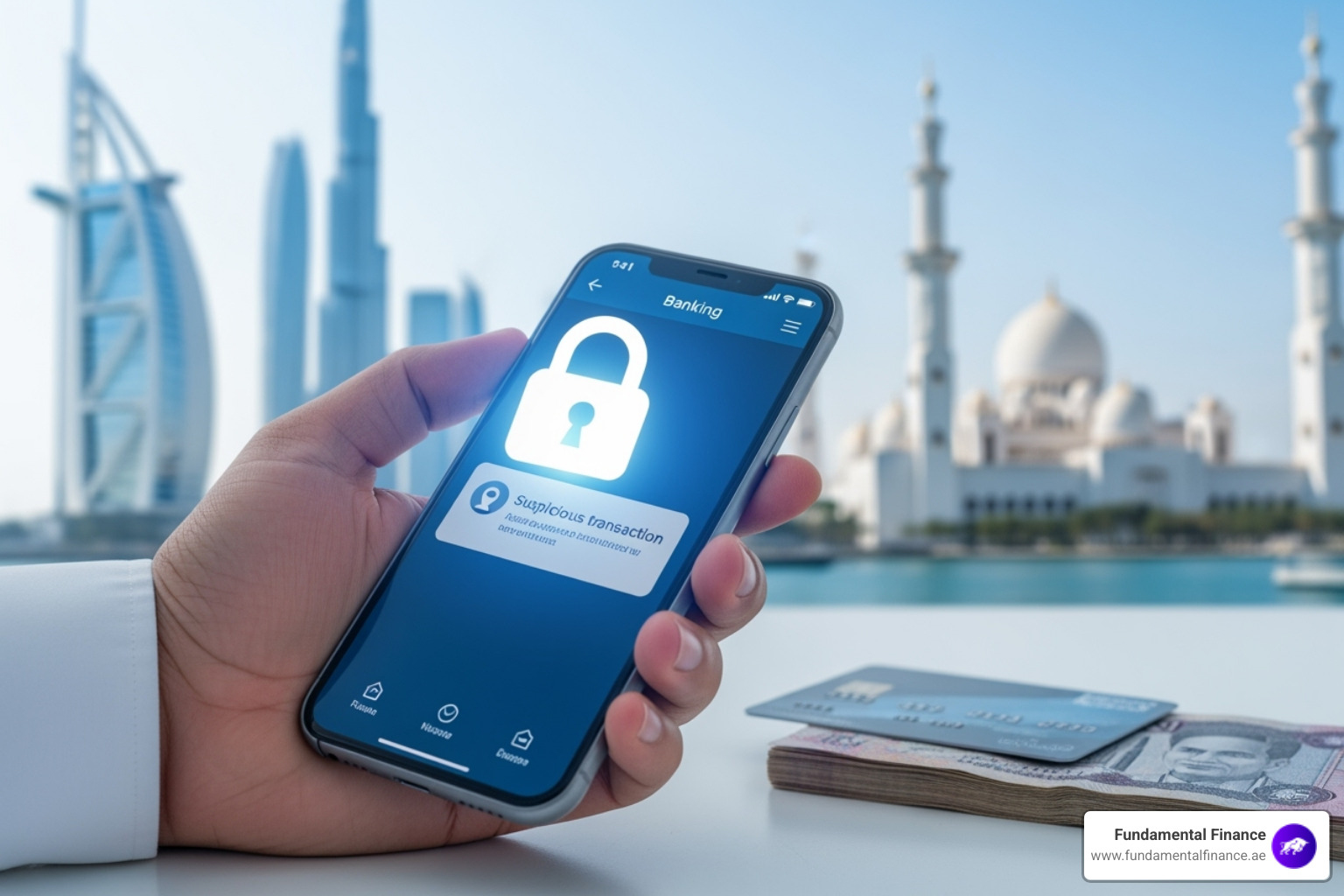
Why Financial Scam Protection is Critical for UAE Residents
How to Protect Your Money and Identity from Scams in the UAE begins with understanding the daily threat. The statistics are alarming: over 50% of UAE residents have fallen victim to phishing websites, and 56% encounter scams monthly through WhatsApp, phone calls, SMS, and email.
Quick Protection Checklist
Immediate Actions:
- Never share OTPs, PINs, or passwords
- Verify requests by calling official numbers
- Use only official websites and apps
- Enable two-factor authentication
Red Flags to Watch:
- Urgent payment demands
- Requests for personal information
- Too-good-to-be-true offers
- Poor grammar in communications
If Scammed:
- Contact your bank immediately
- Report to Dubai Police eCrime or Abu Dhabi Police Aman
- Change passwords and freeze accounts
The threat has evolved. Scammers use sophisticated social engineering and AI tools like deepfake audio to seem more convincing. Dubai Police recently arrested gangs using fraudulent techniques to target residents, with victims losing an average of $1,000 before detecting the fraud.
"Whether it's falling for a fake government website or entering your credit card information into a phishing page, scams can happen to anyone," experts warn. The good news? With the right knowledge, you can protect yourself effectively.
This guide provides UAE residents with a complete roadmap for protection, detection, and response to financial scams.

The Modern Threat Landscape: Common Scams Targeting UAE Residents
The digital age offers financial convenience but also opens the door for fraudsters. The UAE has seen a rise in sophisticated, well-orchestrated scams that use social engineering, making them hard to spot.

Over 50% of UAE residents have fallen for a phishing website, and 56% face scams monthly via WhatsApp, calls, SMS, and email. The average loss is $1,000 before the fraud is even detected.
Fraudsters exploit trust, urgency, and fear—a tactic known as social engineering. They might impersonate officials from law enforcement, courier agencies, telecom companies, or your bank to extract personal or financial information.
The rise of AI has complicated the landscape. Scammers use AI to generate convincing deepfake videos or audio, making their demands sound legitimate. At Fundamental Finance, we believe understanding these technologies, including those in AI Powered Education, is crucial for prevention.
Common scams in the UAE include:
- Investment Fraud: Promises of unrealistic returns, leading victims to transfer money to fraudulent accounts.
- Shopping Scams: Fake e-commerce sites or ads offering deals that are too good to be true.
- Fake Job Offers: Demands for upfront fees or banking details for a lucrative job opportunity.
- Money Mule Scams: Tricking individuals into transferring illegally obtained funds for others.
- "Fake Task" Scams: Luring victims with promises of easy money for online tasks, then asking for payments to open up higher earnings.
Understanding Different Phishing Attacks
Phishing is a fraudulent attempt to get sensitive information by posing as a trustworthy entity. It comes in many forms:
- Phishing (Email): Mass emails with malicious links or attachments. Look for generic greetings, poor grammar, and urgent requests.
- Spear Phishing: Targeted emails custom to individuals using publicly available information to seem legitimate.
- Whaling: Spear phishing aimed at high-profile targets like C-level executives.
- Smishing (SMS Phishing): Fraudulent text messages with links to fake websites or requests for personal data.
- Vishing (Voice Phishing): Phone calls from scammers pretending to be from legitimate organizations like banks or government agencies.
- Angler Phishing: Fake social media profiles of legitimate businesses used to lure victims into sharing private data.
- Pharming: Redirecting traffic from a legitimate website to a fraudulent one without the user's knowledge.
To identify these attacks, always look for urgency, poor grammar, suspicious links (hover to check the URL), and unofficial sender addresses.
Real-Life Examples and Credit Card Fraud in the UAE
Credit card fraud is a major concern. In 2024, hackers leaked 269 million card records and 1.9 million stolen U.S. bank checks on the dark web, highlighting the scale of data breaches.
Common credit card fraud methods include card skimming, data breaches, account takeovers, and fake websites. Unauthorized transactions can result from lost cards, phishing, or data leaks.
UAE authorities are fighting these threats. In April 2024, Dubai Police arrested 494 people in 406 phone fraud cases. As highlighted by Dubai Police, who urge residents to be vigilant, awareness is key.
Real-life UAE scams include:
- Fake Salik/Toll Alerts: SMS messages with phishing links to pay fake fines. Always use the official Salik website or app.
- Bogus Bank Calls: Fraudsters posing as bank staff to gain access to online banking.
- Deceptive Delivery Messages: Texts about an undelivered parcel requiring a small fee or personal details.
- KYC Update Scams: Impersonators claiming your bank details need urgent updating to compromise your account.
Your First Line of Defense: Proactive Protection Measures
Think of scam protection like building a fortress. How to Protect Your Money and Identity from Scams in the UAE starts with creating strong defenses before an attack. Most protection comes down to simple habits that can become second nature.

Digital Hygiene Basics
Your digital security starts with the basics. Strong passwords are your first line of defense. Create long passwords combining uppercase and lowercase letters, numbers, and symbols.
Password managers are essential. These tools generate and store complex passwords for all your accounts, so you only need to remember one master password.
The real game-changer is two-factor authentication (2FA). Even if a scammer gets your password, they can't access your account without the second verification step. Always enable 2FA for your banking, email, and social media accounts.
Secure Online Behavior
When browsing online, small details matter. Always look for HTTPS and the padlock icon in your browser's address bar, which indicates an encrypted, protected connection. If you don't see these on a financial website, close the tab.
Public Wi-Fi is convenient but insecure. Avoid banking or shopping on public networks. Use your mobile data or a VPN for an encrypted connection.
Keep your devices updated. Software updates often include critical security patches. Set your devices to update automatically.
How to Protect Your Money and Identity from Scams in the UAE by Securing Your Digital Assets
Your digital identity needs real protection. UAE Pass is your digital signature for government services, and scammers are trying to trick people into approving requests they didn't initiate.
Never approve a UAE Pass request unless you started the process. If you get an unexpected notification, decline it immediately. Treat every request like a legal document.
SIM-swap fraud is another danger. Scammers convince your mobile provider to transfer your number to their SIM card, allowing them to intercept security codes. If your phone suddenly loses service, contact your telecom provider immediately to check for a SIM swap.
Verifying Legitimacy and Monitoring Your Accounts
The most important skill is learning to verify everything. If someone calls claiming to be from your bank, hang up and call the bank using the number on your card or their official website. Never use contact information from a suspicious message.
Real-time bank alerts act as a 24/7 security guard for your accounts. Set up SMS or email notifications for every transaction. This allows you to act within minutes of a fraudulent charge.
Make it a habit to review your bank statements regularly. The sooner you spot something wrong, the better your chances of getting your money back. Tools like our Budget Calculator UAE can help you track spending and spot unusual activity.
How to Protect Your Money and Identity from Scams in the UAE: A Step-by-Step Response Plan
Even the most careful people can be caught off guard. How to Protect Your Money and Identity from Scams in the UAE isn't just about prevention—it's also about knowing what to do if something goes wrong. Quick action can make all the difference.

Immediate Actions
The moment you suspect a scam, every second counts. Act fast, but don't panic.
Freeze your card immediately. Call your bank's 24/7 fraud hotline to report unauthorized activity and block your card. The sooner you do this, the less damage scammers can do.
Contact your bank directly using an official number. Explain what happened and ask about their chargeback process. Keep detailed notes of every conversation, including the representative's name and the date.
Change all related passwords. Start with your online banking, then email and any other accounts that share login details. Enable two-factor authentication on everything.
Gather evidence. Take screenshots of suspicious messages, emails, or websites. Save transaction records, phone numbers, and email headers to help authorities track the criminals.
Official Channels for Reporting Fraud in the UAE
After securing your accounts, report the incident to the authorities. The UAE has excellent systems to help fraud victims.
- Police authorities: In Dubai, use the Dubai Police eCrime platform to report cybercrimes. You can also call 901 for non-emergencies. In Abu Dhabi, use the Abu Dhabi Police Aman Service. You can always visit your nearest police station.
- Financial regulators: If your bank isn't helpful, escalate the matter to the Central Bank of the UAE. They have the power to intervene. You can also report fraud to the UAE Banks Federation.
- Mobile apps: The 'My Safe Society' app (from the Federal Public Prosecution) and the Ministry of Interior (MoI) app allow you to report crimes directly from your phone.
What to Expect After Filing a Report
Filing a report is the first step in what can be a lengthy process.
Police investigations take time, often months, especially for cross-border scams. Authorities will review your evidence and may contact you for more details.
Bank chargeback procedures are typically faster, taking days to weeks. Your bank will investigate the unauthorized transactions to determine if the funds can be recovered.
Communication with authorities is key. Keep all reference numbers and follow up regularly.
Potential outcomes vary. The harsh reality is that only about 9% of victims recover their losses completely. However, reporting helps prevent others from falling victim and strengthens the overall fight against cybercrime. Quick action and successful investigations can sometimes lead to recovery.
The Legal Framework: Rights, Penalties, and Seeking Help
The UAE takes financial fraud seriously, and understanding the legal landscape is a crucial part of How to Protect Your Money and Identity from Scams in the UAE. You have strong legal protections, and the penalties for fraudsters are severe.
The country's framework is built on Federal Decree-Law No. 34 of 2021 on Combating Rumors and Cybercrimes (the Cybercrime Law) and the Federal Decree-Law No. 31 of 2021 (Penal Code). These laws cover electronic fraud, hacking, identity theft, and impersonation.
Penalties for Fraudsters
When caught, fraudsters in the UAE face serious consequences that reflect a zero-tolerance approach to financial crime.
- Imprisonment can range from 1 to 15 years, depending on the severity of the crime.
- Fines can reach up to AED 2 million, designed to be financially ruinous for criminals.
- Deportation is an additional consequence for expatriates convicted of financial fraud.
These penalties send a clear message that the UAE is committed to maintaining a secure financial environment.
How to Protect Your Money and Identity from Scams in the UAE with Legal Support
For significant financial fraud, consider professional legal assistance. A specialized fraud lawyer can be invaluable.
A lawyer's role is to ensure your police report is filed correctly, represent you in legal proceedings, and explore all avenues for recovering losses, though recovery is often challenging.
Business security measures are often legal requirements. Companies must implement secure payment gateways, verify customer identities, and train employees on fraud detection. Protecting customer data is a legal and ethical obligation.
At Fundamental Finance, we believe financial literacy is your ultimate defense. Our mission is to empower UAE residents with money skills through our gamified FunFi app. Our Gamified Financial Literacy approach makes learning about financial protection engaging and effective. When you understand how money works, you're much harder to fool.
Frequently Asked Questions about Financial Scams in the UAE
Here are answers to common questions about How to Protect Your Money and Identity from Scams in the UAE.
Can I get my money back after being scammed in the UAE?
This is a tough question. The harsh reality is that only about 9% of scam victims ever recover their money.
However, your chances improve dramatically if you act fast. If you report unauthorized credit card fraud immediately, your bank can often reverse the charges. The key is that the transaction was "unauthorized."
If you were tricked by social engineering into willingly transferring money, recovery becomes much harder because you technically authorized the transaction. Your best chance involves immediate action: contact your bank and file a police report with the Dubai Police eCrime platform or Abu Dhabi Police Aman Service. Prevention is always better than chasing a recovery.
What should I do if my bank isn't helping with my fraud claim?
It's frustrating when your bank seems unhelpful. Don't give up.
First, lodge a formal complaint with your bank's fraud department and get a complaint reference number. Keep detailed records of all communication.
If the bank's internal process fails, escalate your complaint to the Central Bank of the UAE. As the regulator, they oversee all banks and can investigate your complaint to ensure proper procedures were followed.
For significant losses, consider seeking legal advice. A lawyer can assess your case and advise on your rights. Stay persistent and document everything.
How can I tell if a call from my bank is real?
Spotting fake bank calls is simple once you know the rules.
The golden rule: Your bank will NEVER ask for sensitive information over the phone. They will never ask for your PIN, full password, One-Time Password (OTP), or the 3-digit CVV code on your card. If anyone asks for these details, it's a scam.
When in doubt, hang up and call back. Use the official phone number from your bank's website or the back of your card. Never use a number the caller provides.
Watch out for pressure tactics. Scammers create urgency, threatening to close your account or have you arrested. Real banks give you time to think and verify.
Trust your instincts. If a call feels off, it probably is. Legitimate banks already have your information; they don't need to call and ask for it.
Conclusion
How to Protect Your Money and Identity from Scams in the UAE is about developing a vigilant mindset. Scammers are getting smarter, but so can you. While the statistics are sobering, nearly every scam is preventable with the right knowledge and quick thinking.
Your protection strategy boils down to three core principles:
- Be vigilant: Question every unsolicited call, text, or email asking for personal information or money.
- Protect your data: Use strong, unique passwords, enable two-factor authentication, and treat your UAE Pass like a digital signature.
- Act fast: The moment something feels wrong, contact your bank and report the incident. The first few minutes are critical.
We've provided the roadmap, from official reporting channels like Dubai Police eCrime and the Central Bank of the UAE to the red flags to watch for. But knowledge must be applied.
Financial literacy is your ultimate defense. When you understand how money and digital identity work, you become a much harder target for fraudsters who prey on confusion and panic.
At Fundamental Finance, our mission is to build a community of financially empowered UAE residents. Through our free FunFi app, we help people spot scams and make smart money decisions with confidence.
The future of financial security depends on each of us taking responsibility. When you share this knowledge, you help make the entire UAE a less attractive target for fraud.
Ready to take the next step? Take control of your financial future by exploring our resources and see how our gamified approach makes learning about money effective and enjoyable.
.avif)
Get Early Access
to Our Mobile App
Be among the first to explore FunFi, designed to make mastering money simple, practical, and fun!

.avif)